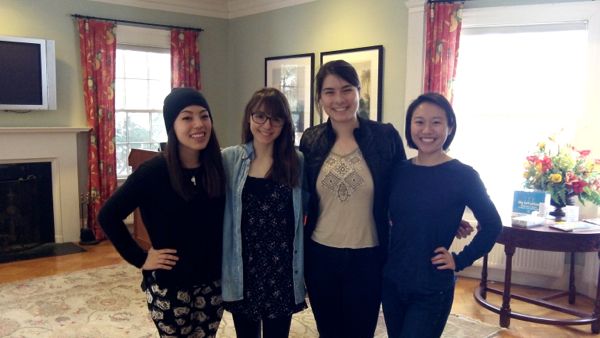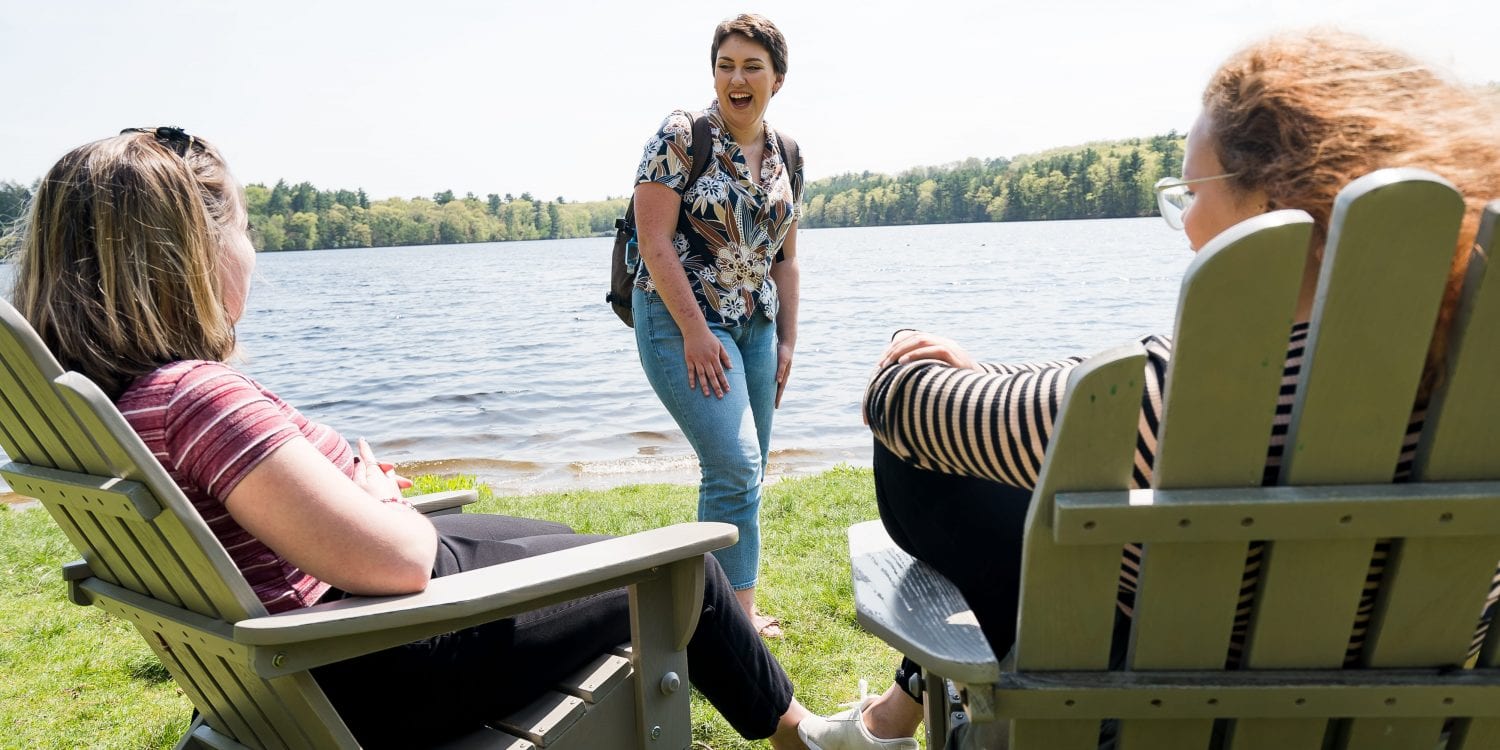
THE BLOGGERS! We met up for our bi-annual meeting to report on how everything is going. Lia, Caitlin, me, and Emily– Paulina had to leave early, but she was there too!
It’s so weird, familiarity. It manifests itself in dozens of tiny, subtle ways: so slow-acting that I never take account of it. Like when I’m walking back from Harvard Medical School, after having spent the weekend working on my experiment. Before leaving, I check the lab—good, I didn’t leave anything out of order; I’ve gotten in trouble for that before. I check the communal fridge in the kitchen—nope, I ate all of the food I brought with me for my impromptu sleepover (no, that’s not correct; it was highly planned.) I check my locker—sleeping bag and pillow are safely stowed, everything that needs to brought with me is in my backpack. I open my computer, immediately switch to the correct network, pull up schedules for both the Wellesley Senate Bus and the M2 bus, which would take me to the Wellesley bus stop. The M2’s not running for forty minutes; that’s fine, it’s less than two miles. I pull out the two extra jackets I brought, stuff my backpack full, and walk, noting immediately that the ground is solid ice underneath the snow that’s falling. At the bus stop, one of the other girls waiting says: “Is the bus running late? Again?” I smile to myself. I’m expecting the bus to show up 30 minutes late (it’s supposed to come at 2pm, but it’s a weekend and there’s some snow) and I’m delighted when it gets there at 2:14pm on the dot.
I know my way around MIT, around Back Bay, around Downtown Boston, around the T and subway and buses. I know Wellesley College and I’ve run to the nearest towns on its sides. I have the cafeteria schedules memorized, both Wellesley and MIT; I know restaurants and transportation options and timing and fees. I know classes and professors, pre-med requirements, what’s doable during a semester, orgs on campus. I run into a surprising amount of people I know on whichever campus I happen to be.
I know how I dress, what I like, what I eat, what probably won’t change. How I work, what I’ll always have to work on, friends who can predict these things too. I’m reading a book Tiffany recommended to me—when I read the words, I’m reading less the author and more what resonated enough with her to hand the book to me.
And the best thing about the comfort of familiarity (besides optimization of scheduling, naturally) is that it brings forth some new things too. This month, I’m driving a Zipcar down to Connecticut for a conference. I hate driving, and have since I started. There’s something about eco-friendliness thrown in there, but it’s mostly a deeply-ingrained fear that I’m someday going to hit someone. But hey, I applied for a Zipcar membership, I signed up for this conference no one else at Wellesley is going to, and I’m going to drive 200 miles to get there and back. The thing I’m most frightened of, actually, is filling up at the gas pump. I’ve done it once and seen it done countless times, but I REALLY don’t like driving. But you know, I can still sometimes remember my post about taking the bus into Boston for the first time. It may be unreasonably scary, but there’s this confidence in knowing I’ll make it through.
Another small victory this semester—signing up for a PE (physical education) class. My friends all just nodded when I told them. “Weightlifting again?” they asked. Because I am far more comfortable with weightlifting than Dance Basics, which is the class I decided to take. Again, I hate dancing, and this too is born out of a sort of primal fear that might date back to my first experiences of watching grinding in middle school. I didn’t say it was rational, but that was one of my main reasons for not going to Prom in high school, and it’s caused plenty of social missteps besides. So here I am, first day of Dance Basics class, absolutely sure I’m going to hate it and then I can have my Tuesday and Thursday nights free again. We then proceed to do a series of movements that feels a lot like yoga and good bit like ballet, and the next time we do lots of purposeful jumping up and down and leaping, and no one knows what they’re doing and our teacher says the purpose is to have fun first and dance second, and then I have to admit that I skipped over to Blair announcing “This class is TOTALLY fun!” Just the movement, the people, the emphasis on fun—who knows why, but I left the class skipping, pumped to go do some more cardio after on the stairstepper. (And isn’t that a great conclusion to that story, but that’s exactly how I feel every time.)
There are much fewer new things than when I came to college. And maybe I wouldn’t have tried for anything new—zipcar-ing, dancing, being more social—because everything is familiar, and incredibly comforting. But what has been hitting me a bit is this panic, this this is the last chance you’ll get that comes from senior spring. Along with that, the gratifying thought that there isn’t much I have regretted. Sure, if I did my four years over again it would have been different—I might have joined the cross-country ski team, taken a drawing class, taken more computer science classes, gone to more free movies at Collins, or any number of other things I’d have enjoyed. But really, I’ve done a good portion of the things I’ve wanted to do, did what I could with my time with whatever mental position I was at that moment.
Last week was my first week of classes. I’ve taken introductory MIT classes before, but this is the first time I’ve really had the full larger-school experience. Linear Algebra and Introduction to Machine Learning are both taught in 10-250 (that’s Building 10, room 250), which I have to imagine is one of MIT’s biggest lecture halls. There have to be at least 300 students in there. It’s so classic MIT—if you ever watched MIT’s OpenCourseWare videos for physics class, you’ll know exactly what I’m talking about. The professor is at the front of the room, with a microphone, drawing with chalk on the blackboards. The blackboards are mechanized, moving up and down with button presses. You can’t really erase with a blackboard, since it gets all white-smeary, so at the beginning of every class you see the previous professor and the next professor going at all of the slowly-descending and ascending boards with spongees and a water bucket. If the professor is wearing black, they’re sure to be covered in chalk by the end. (I heard two girls discussing the financial merits of blackboards versus whiteboards behind me. They were confessing they didn’t know the breakage rate of chalk compared to Expo markers when they were interrupted by class starting.)
There’s something freeing about the anonymity. I have a friend each for both classes, so I have someone to sit with (we sit near the front in both cases). One friend is all I need, and it’s kind of nice to know it’s your choice to come to class or not, that MIT films most of these lectures and that previous lectures are available online, and that if something comes up and you have to leave early or come in late you don’t have to bend over backward to make sure it all works out. Even the recitations, which are the smaller class sections after the large lectures, have something like 40 people each. The expectations are different from other classes I’ve had, especially if I compare to Wellesley’s Neuro 320 (Vision and Art) and MIT’s 9.71 (fMRI Investigations of the Human Brain). Of all my classes at college, I probably value those two the most, because they were by far the most challenging in terms of making me think. They were both small classes, with less than ten people, upper-level courses (meant for juniors and seniors), and were the kind of classes where you were expected to a do a lot high-quality original thinking, got a lot of support in correcting that thinking, and were moreover expected to be present and very engaged in class. I can hardly even compare the classes I was taking last semester to this semester, because they’re completely different types. And when people ask me whether I like classes at Wellesley or MIT better (which happens pretty often, and I’m always happy to talk about) I tell them the same thing—they’re in different categories, I take classes at each for different reasons, and that being able to attend both makes me appreciate them both more.
It’s been hard last week with all of the traveling—I’m at MIT every day this semester, so I leave on the 7am or 8am bus and get back on the 12pm-5pm bus, depending if I drop by Harvard Medical School to work on my experiment. I’m sure you’ve heard about all of the snow Boston’s been getting—it also means that last week was pretty brutal in terms of traffic. I’ve never been so in-tune with how weather affects a city. I definitely wasn’t the only one complaining about two-plus hour commutes early in the week. But it’s gotten better since the snow has stopped coming down in sheets, and snowflakes really are beautiful, if you’re waiting at a bus stop, inspecting each one as they land on your glove.
I’m getting to spend Sunday at Wellesley (every other day this past week I’ve been at Boston at some point), and it’s wonderful to be home. My classes are looking good, I’ve got friends in both locations, the administrative stuff is done for the first week of school, my thesis is progressing nicely, I’ve got my schedule worked out, my future-prep work is going well (I’ll keep you updated on how the job search goes), and everything’s ticking along as best as it possibly could. I think I’ll need one more week to get in the groove: senior spring, here I come :).
Monica

